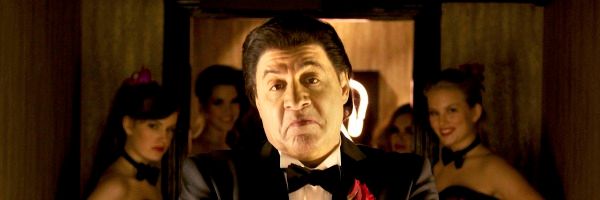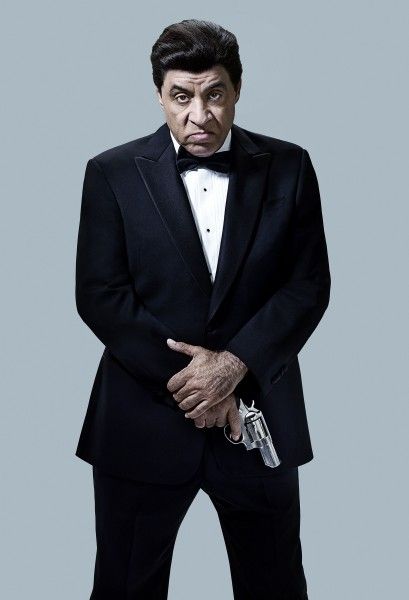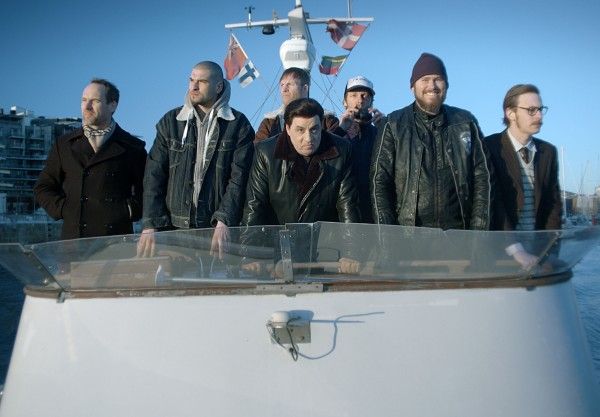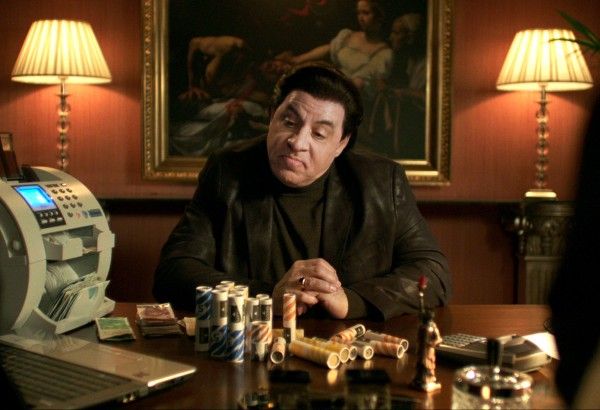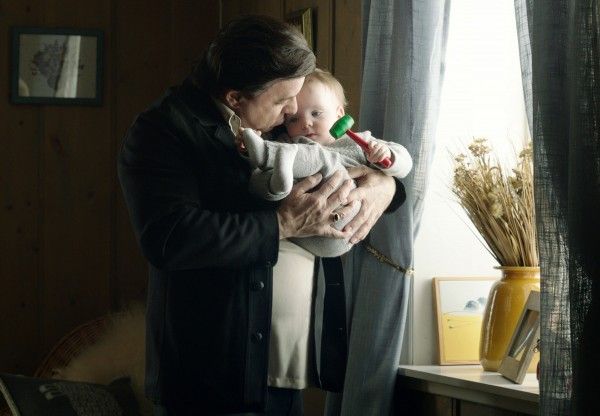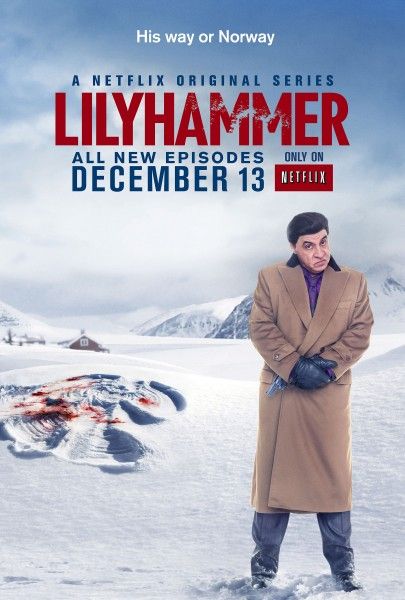Season 2 of the popular series Lilyhammer will be available via Netflix on December 13th. The series follows former gangster Frank “The Fixer” Tagliano, played by actor/executive producer/co-writer/music supervisor Steven Van Zandt, as he enters the federal witness protection program, trading the mean streets of New York for the icy fjords of Norway and forging a new life among the locals of Lillehammer.
During this recent interview to promote the series’ eight new episodes, Steven Van Zandt talked about the remarkable success Netflix has had with original programming, how proud he is that Lilyhammer was their first original series, what it was like to live and work in Norway, having only eight-hour workdays on set, the difference between Norwegian sensibilities and American sensibilities, how Frank handles fatherhood, and what he hopes viewers get from watching this show. Check out what he had to say after the jump.
Question: The first season of Lilyhammer came at a time when people were just getting used to the idea of exclusive series from Netflix. Now, in the time that’s past between seasons, there have been a whole bunch of new and successful original series. What’s it’s like to come back to the platform, after it’s grown in prominence so much?
STEVEN VAN ZANDT: I know. It’s been an amazing journey to watch it. It’s just two years. It’s hard to believe it didn’t exist, and now Netflix has just become this amazing powerhouse, right up there with HBO. We were very proud to be the first. It was an amazing history-making choice by Ted Sarandos and the Netflix people. To go with a foreign show first made a statement that has reverberated through the entire world. At that time, I went to MIPCOM in Cannes, and I was talking to four or five different countries a day, for that whole week, and I must have spoken to 25 to 30 different countries. And all they could talk about was the fact that Netflix chose a foreign show to be their first original program with subtitles. This was mind-boggling to the world because it made you know this discussion about the international market place, now being expanded because of the digital distribution. It became more than talk. All of a sudden, it was real, and Netflix made it real.
It’s been a remarkable thing to watch. And then, they had five hits in a row, on top of that, which blew everybody’s mind. So, it’s great to go back now, with the second season. I think it’s going to be you know quite impressive for people who maybe be tuned in to the first season, out of curiosity, and were attracted by the eccentric nature and fun premise of it. We caught everybody by surprise, and we were a surprise hit. But now, we’re going to actually deliver on the promise of the first season. I think we really stepped up our game, and we’re going to be a show that can be compared to any other show on American television. I’m very, very proud to go back to this new, continuing Golden Era of television, and Netflix is right at the forefront of it.
How did you get involved with this show, to begin with?
VAN ZANDT: I have a radio show that’s worldwide, and I play a lot of Norwegian rock ‘n’ roll. That happens to be a place that loves Americana, in general. I also have a record company, and I was in Bergen, Norway producing a Norwegian band. Somebody told me that the husband and wife writing team wanted to say hello, so I met with them and they gave me the one-sentence pitch, which was, “A gangster goes into the witness protection program and chooses Lilyhammer in Norway,” and I had several thoughts at once. First of all, I thought, “Oh, geez, I just played a gangster for 10 years. I really probably shouldn’t do this.” Then, I thought, “What a wonderful idea this is.” There are not that many great ideas in the world. When you hear one, you better recognize it, and I recognized it, immediately. Knowing as much about Norway as I did then, and of course a whole lot more now, I knew they were a very, very conservative country. They are very much a mono-culture that’s very, very civilized, with very little crime and no poverty. It’s a very, very interesting place, and it’s a very mysterious place. Nobody knows anything about Norway, really. So, I thought, “This is just a perfect premise. We can not only have a wonderful fish-out-of-water story here, with a one man crime wave, coming into a place where there is no crime. We can also have fun with these cultural differences, and we can make Norway one of the characters of the show because nobody knows anything about it.” It was just too irresistible. And they wanted me very much involved.
All of my business people said, “Are you crazy? You just came off of the greatest show in history, and now you’re going to go to Norway? Who knows how good this show’s going to be?” Everybody was questioning it, as a career move. But, once they wanted me involved as one of the producers and writers, I felt like, “If I can control the scripts and have some say in the production, then I feel confident enough that I can make this thing work.” We spent a year on the first season of the script because a whole lot of questions had to be answered. I did not want to do a straight ahead comedy or a farce. I wanted it to be a dramedy. I wanted to have some serious moments in it. And then, we had to decide how much English should be spoken, and how people would understand that he understands Norwegian, but doesn’t speak it. And then, that first season was really amazingly popular and caught on. This year, we have really stepped up the game to be even better. I’m very, very proud of the whole thing.
What was it like to live and work in Norway?
VAN ZANDT: It was actually perfect because whatever the character was going through in the show, I was going through it myself, as the actor and producer. Every bit of cultural shock that he was experiencing, I was experiencing, so it really helped. I found myself adapting to things that I never would have thought possible, such as roaming outside for 10 hours, in 10 below zero weather. It’s a very different working culture. You have a much lower budget, and you get a lot of bang for the buck out of those lower budgets, but that means not a lot of frills. I had the only trailer in the history of Norwegian TV, and everybody liked it and shared it with everybody. Craft service was an apple and a pot of coffee. You don’t realize how much we’re pampered here, until you go over to Norway. I literally saw one stuntman, in two seasons. And after the guy did the stunt, the actor did it anyway because he felt guilty.
They’re much tougher people than we are, and they’re much more civilized, at the same time. That meant literally working nine to five, which I found incredible. You could actually have a life and do the show. That was just unthinkable, doing The Sopranos. We would work 10 or12 hours, regularly. You actually could have dinner with somebody, or you could have a meeting, and you can actually have a life. So, as an actor, it was wonderful. As a producer, I’m like, “We’re not getting enough done. This is not good.” I’m kind of schizophrenic about that. We do 15 working days on a show, which is a bit longer than most American shows. And because you’re literally working eight hours, most of the time, there are a lot of differences to get used to, most of which were all good. In the end, it was a lot of fun, and an adventure.
How did you balance going back and forth, between home and Norway?
VAN ZANDT: Well, in the first season, I literally worked every other week because I had so many things going on [at home]. I told them, “The only way I can do this is if I work every other week.” And I figured they were going to say no, of course. Whoever heard of a star working every other week? But they said yes, so every single Saturday, for six months, I flew there or I flew home. It’s an 8 ½ to 9-hour flight, which I actually grew to really like. I loved that time alone. I could read, I could write, I could catch up on movies or TV shows, and no one bugs you. I wished the flight was even longer, to tell you the truth. So, I got used to that. And then, for the second season, because I squeezed it into the middle of my tour with Bruce Springsteen, I was only going home, every other weekend. But I got used to the commute, and I really grew to like it.
This is a Norwegian and American co-production. Is there a difference between Norwegian sensibilities and American sensibilities, in terms of a sense of humor or character development?
VAN ZANDT: That’s a very good question. When I became one of the writers, I sat down with the two creators and we spent a year asking ourselves those questions. I said to them, “As we approach this thing, to make it more international, since Norway had never, ever sold anything internationally, I believe that we should make it more Norwegian.” I wanted it to be as Norwegian as possible. I wanted to know everything that is eccentric about Norway, and everything that is different, funny, unique, and all of that. If you focus on nuance and detail and the things that have local interest, those are the things that are most universal. Those are the things that people gravitate towards and love to see. People love learning about different cultures and detail and how other people live. I think it’s just human nature.
So, we combined that with the interesting idea that the lead character was going to speak English. He understands Norwegian, but doesn’t speak it, which happens over there quite often. It’s actually a very tough language. So, the fact that the guy speaks English brings the American audience immediately into the show, and you start to live the show the way the character does, experiencing Norway the way he does. After a few minutes, you forget about the subtitles, which is a really, really interesting phenomenon that could possibly be repeated in the future, in other shows. I’m sure every country in the world has some cool TV show that we’ll never see. But, maybe if you stick an American in there, with a little bit of English, just to hook you in, all of a sudden, you can turn people on to an entire new culture. That’s a whole interesting thing to explore, in the future.
How does your character handle fatherhood, in this new season?
VAN ZANDT: I think the best word would be reluctantly. He’s trying. He’s sort of into it. The culture forces him to be into it a little bit more that he would normally be. I don’t want to reveal too much, but it’s one of the fun new things that you’ll see this year.
What are we going to learn about Frank, that we didn’t learn about him, in the first season?
VAN ZANDT: Well, what we’ve done this year is have him evolve into being more integrated now in the culture, a little bit. He’ll never be completely there. But we have an interesting device this year, starting with the very first episode, where we introduce a third element, in the guise of the English hooligans who now invade Frank’s Norwegian’s space. He has now become a bit acclimated and a bit integrated, and now we have a third element coming in. That leads to a whole interesting new dynamic, where he’s no longer the invader, but he is being invaded. It shows, to some extent, that he is beginning to become more Norwegian and learning a bit from that culture, as well as bending it to his will, by going around bureaucracy. So, he is basically becoming a bit more comfortable, and that leads to a whole other angle, when we bring in this additional foreign element.
What do you hope that viewers get out of watching the show?
VAN ZANDT: There’s a lot going on in this show. Hopefully, it will give you a more open-minded understanding of different cultures. I think the Norwegian culture is something we could learn from. For instance, this year we have the Norwegian concept that the father of a new baby is required by law to actually go home and take three months off from their work and actually be a father. Parenthood is literally shared there, and they have healthcare and education for free, from womb to tomb. They are extremely highly evolved, and much more civilized than we are. There’s no crime, there’s no homelessness, and there’s no poverty. There are many, many things to learn from this show, in terms of the Norwegian culture. Our second episode this year talks about racism.
We’ve thrown in lots of lots of things that make people think, as well as being entertained. That’s what I do with everything I do, pretty much. You’re always trying to make sure there’s some substance, along with the entertainment. We are in this new Golden Era of television, which is now expanding globally with Netflix. Soon, there will be Google TV, Amazon TV and Apple TV, and all kinds of new content providers, which is good for content creators and good for adult entertainment because the movie business is now strictly for kids. It’s all comic books and video games. The 20 movies mentioned at the Oscars are probably the only movies made for adults, each year, and very few of them make money. So, all of the adult entertainment, and not just sex and violence and language, but intellect and complex plots and complex characters, are now all on subscription TV, and I believe that’s the future. It’s wonderful to be a part of it.
Season 2 of Lilyhammer will be available at Netflix on December 13th.

